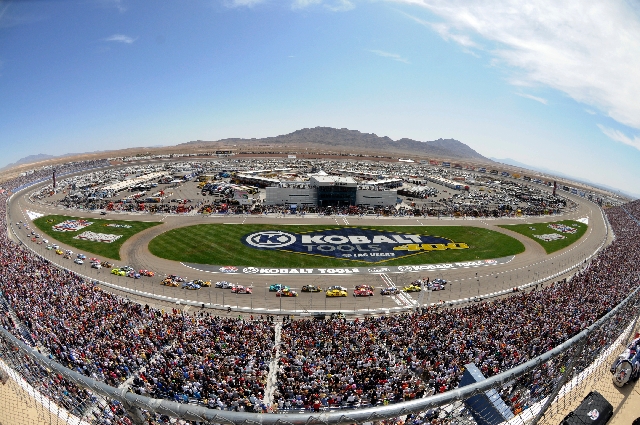Race organizers wheel out big names to tout virtues of NASCAR

The major leagues of car racing comes to Las Vegas next weekend. So race organizers rolled out former mayor and NASCAR fan Oscar Goodman along with Las Vegas native and big-time racer Kurt Busch on Thursday to extol the economic virtues of hosting a NASCAR race.
Citing Las Vegas tourism authority data, Las Vegas Motor Speedway officials said last year’s three-day NASCAR race weekend generated $240.6 million in spending in the Las Vegas area with 71 percent of the fans coming from out of town.
Chris Powell, the speedway’s president, said tickets for the main event, the Kobalt Tools 400 NASCAR Sprint Cup Series race, are sold to fans from every state and from 25-30 countries. Powell said NASCAR Sunday brings in 130,000 fans to the speedway and the visiting fan’s average stay is 3½ days. It’s NASCAR’s 16th visit to Sin City.
Speedway officials said Las Vegas Convention and Visitors Authority data showed 2012 spending was up $46 million from 2011, when the economic impact was $194.7 million. Race-related spending has increased annually for the past four years.
The first NASCAR race in Las Vegas generated $116.2 million in 1998, with the low number dropping to $97.1 million in 2001. Organizers said the total NASCAR spending in Las Vegas is more than $2 billion since 1998.
Powell said major fan feeder states are California, Utah and Arizona — and also the Midwestern states such as Ohio, Wisconsin, Minnesota and Iowa.
“A lot of fans have cabin fever and want to get out and go to some place warmer,” Busch said at a luncheon news conference at race sponsor Stratosphere.
The uptick in 2012 race spending stems from an increased number of race attendees staying in hotels with increased room rates and fans staying longer in town, LVCVA spokeswoman Courtney Fitzgerald said.
She said the total nongaming spending for 112,000 out-of-town NASCAR race visitors was $176.6 million, with the total economic impact (including gaming budget but not gaming spending) for those visitors hitting the $240 million mark.
Busch said the high number of out-of-town fans is evident on the Fridays before the big Sunday NASCAR race. Busch said he’s amazed by the high number of race fans who attend Friday time trials when racers vie for the Sunday pole position.
“This is a destination for race fans,” Busch said.
The fan spending numbers come from surveys of race fans as they enter the gates for the Sunday race, and includes attendee gaming budgets, Fitzgerald said. Out-of-town fans who are surveyed say how much they spend and the per capita spending is multiplied by the number of visitors, she said.
Many sports economists such as the University of Chicago’s Allen Sanderson are skeptical of the economic impact numbers offered by event organizers and public agencies. Sanderson said he has not seen the NASCAR race data from Las Vegas, but generally believes the net economic impact of big events such as NASCAR races is “off by a factor of five to ten.”
Sanderson said a lot of the money spent at corporate-owned hotels, restaurants and other businesses leaves the area to headquarters in out-of-region cities.
“A lot of the money exits the area,” he said.
But sponsors such as the Stratosphere said the NASCAR weekend is an economic windfall.
“It’s one of the biggest weeks of the year,” said Paul Hobson, Stratosphere general manager. “What we get with race fans is that they eat in restaurants and play in the casinos.”
Contact reporter Alan Snel at asnel@reviewjournal.com or 702-387-5273.












